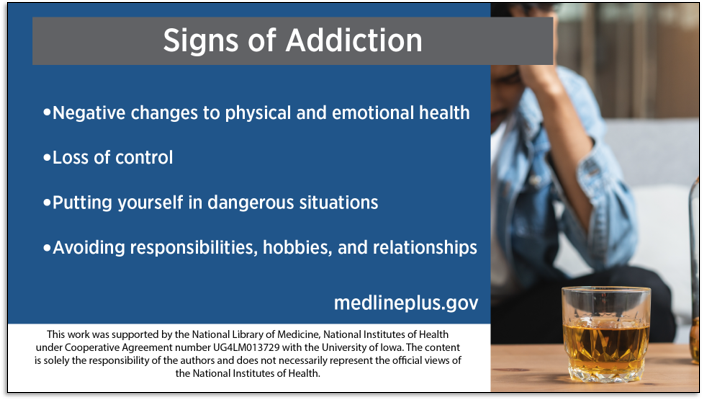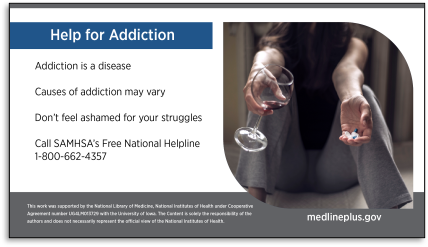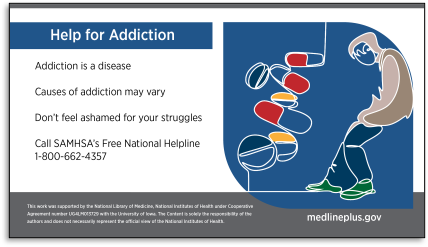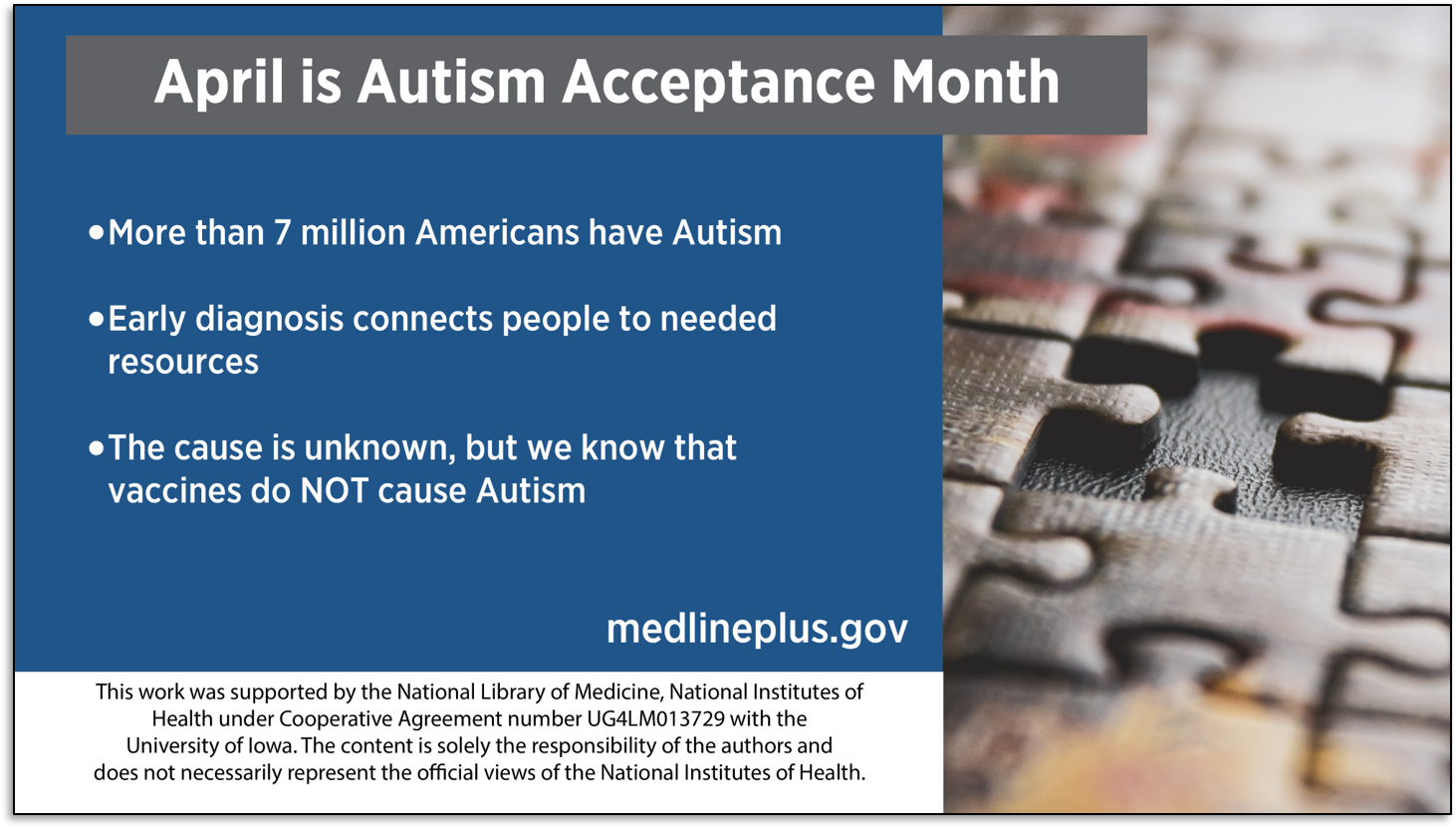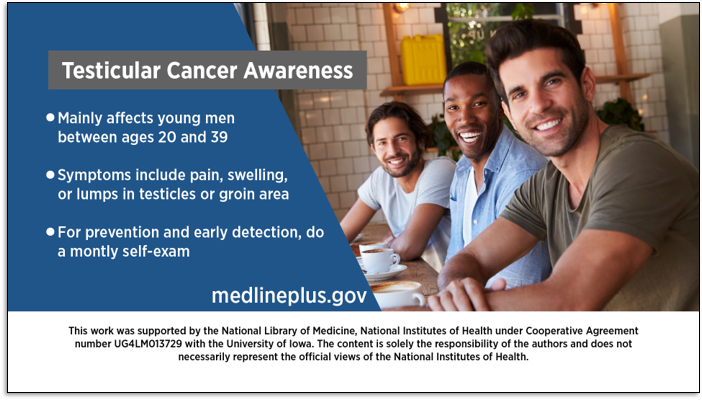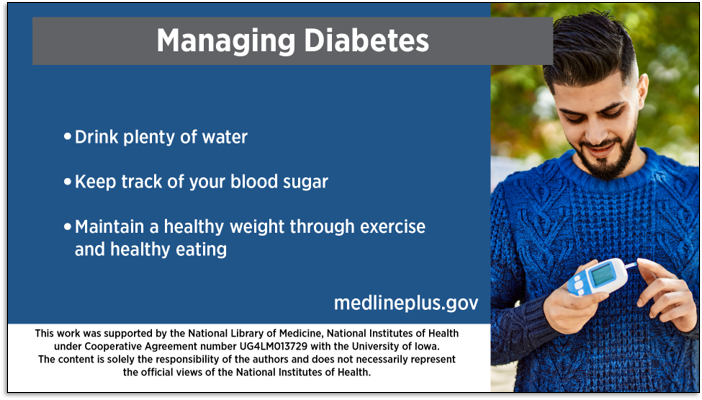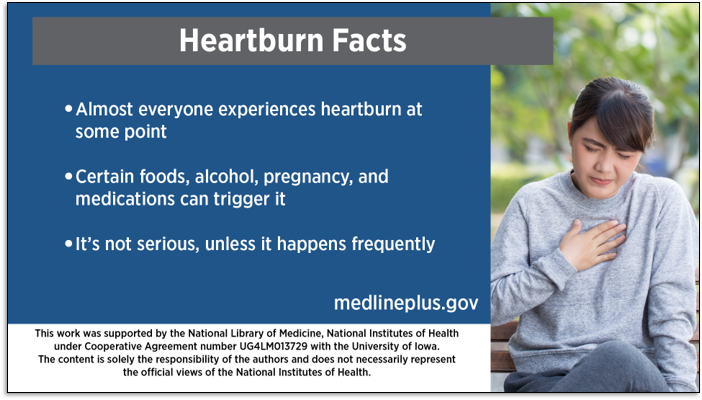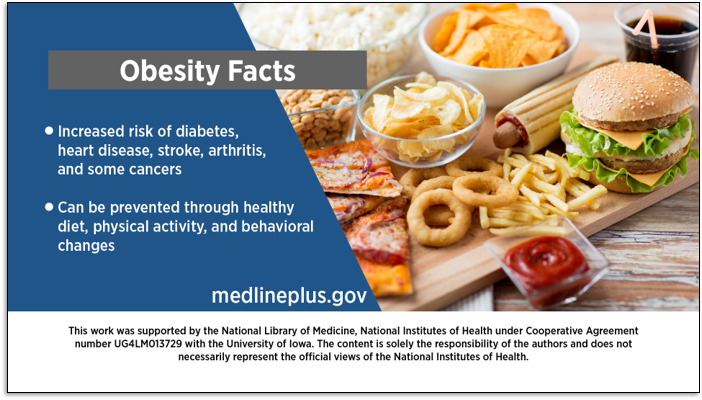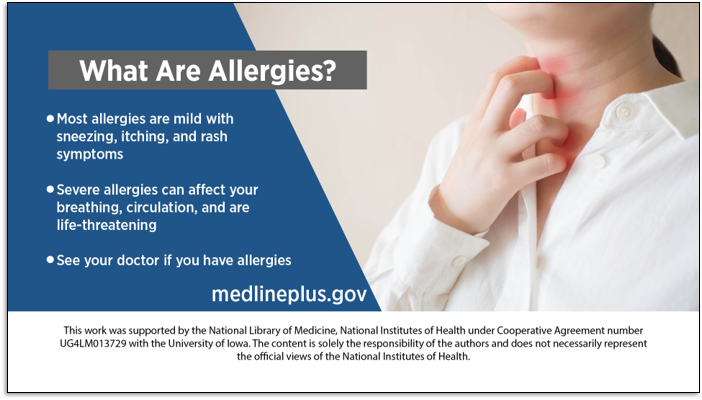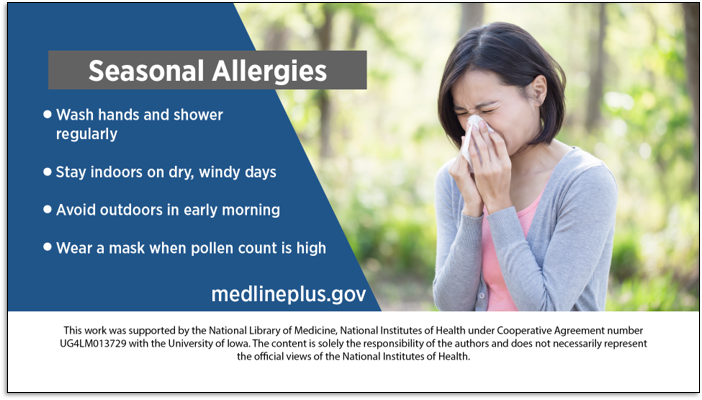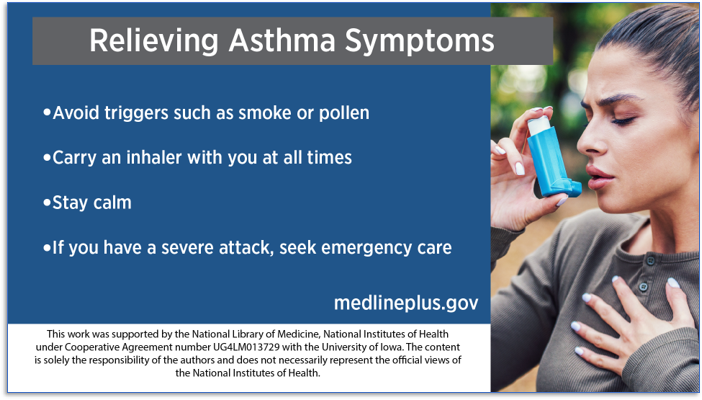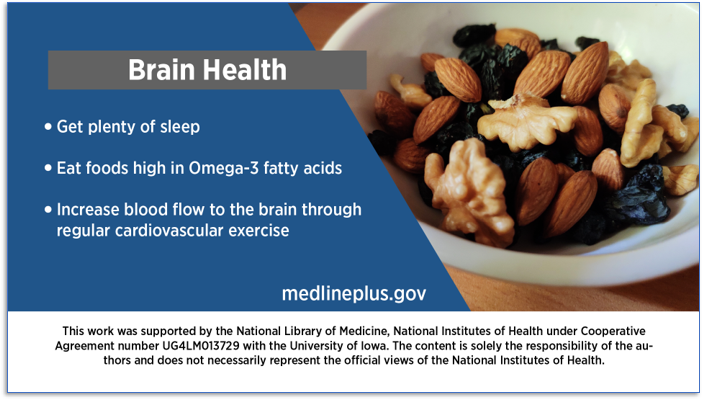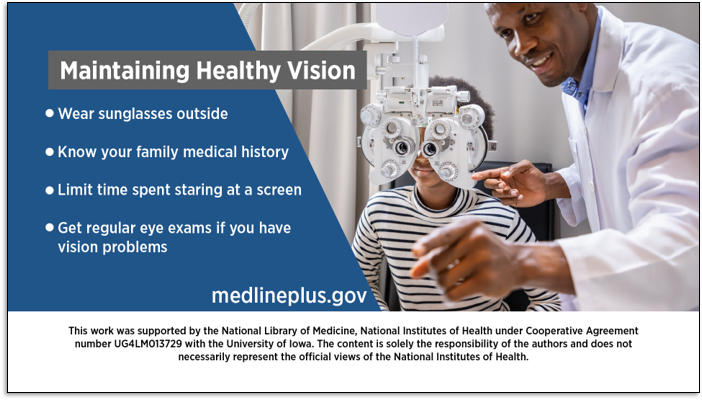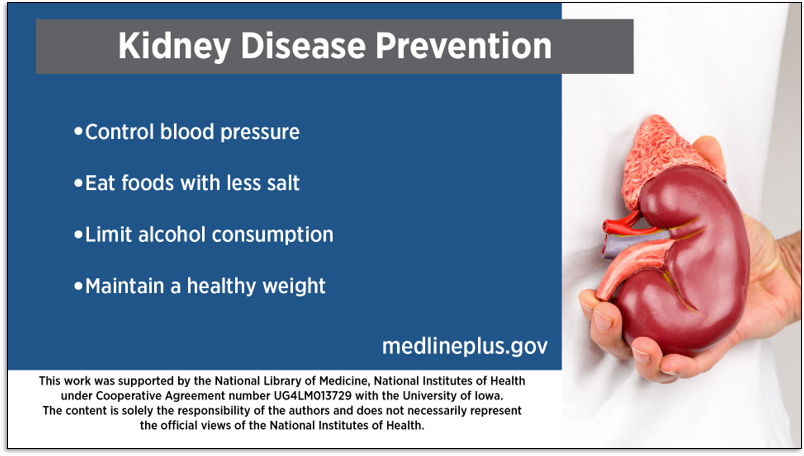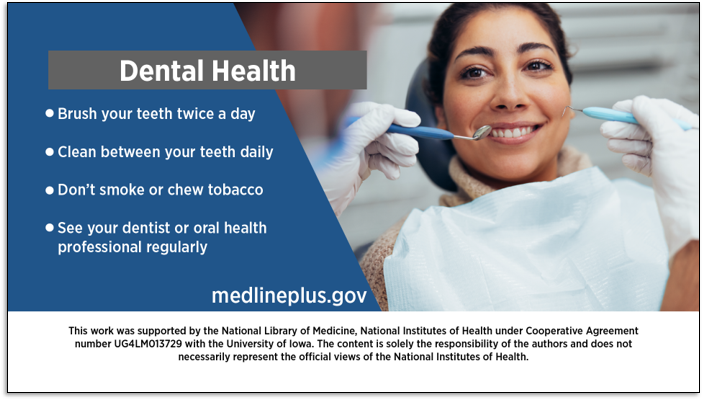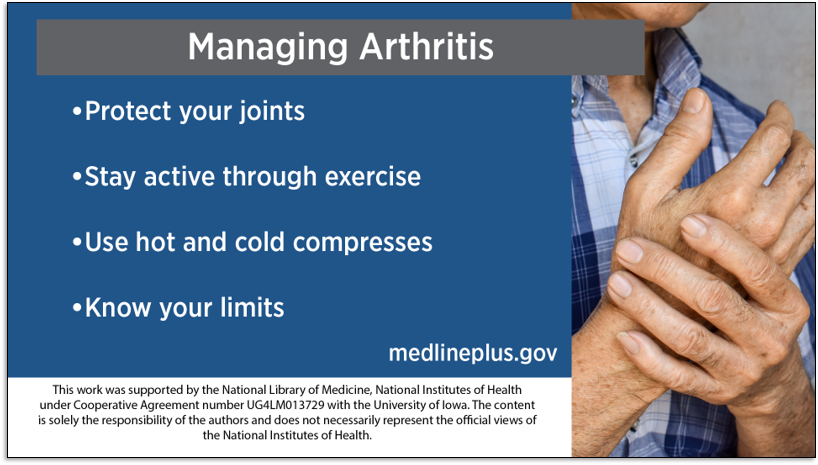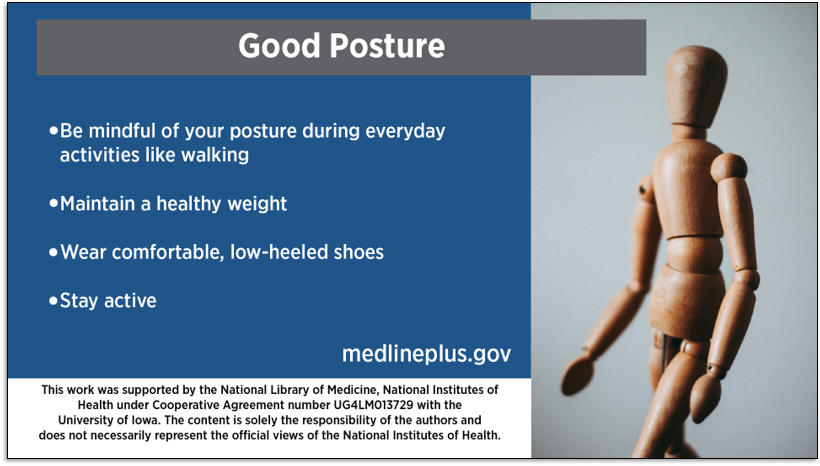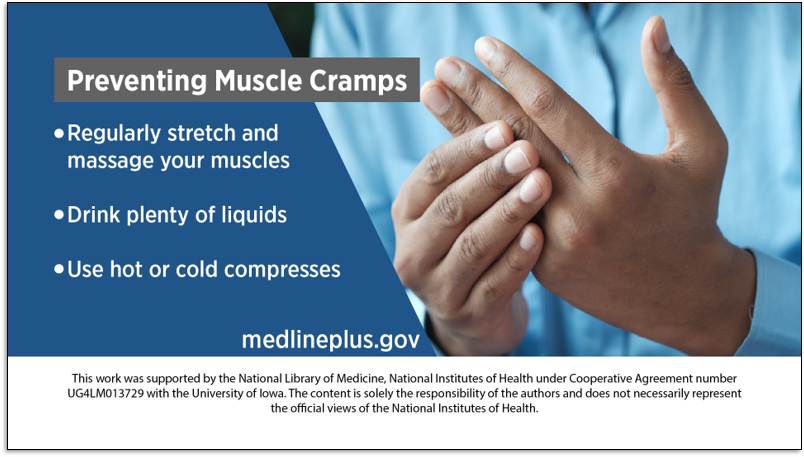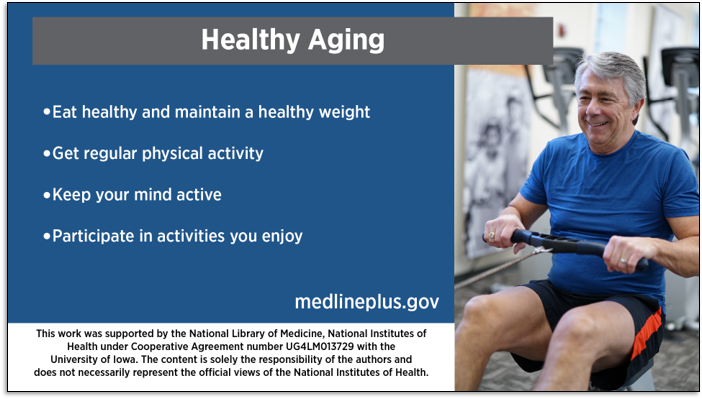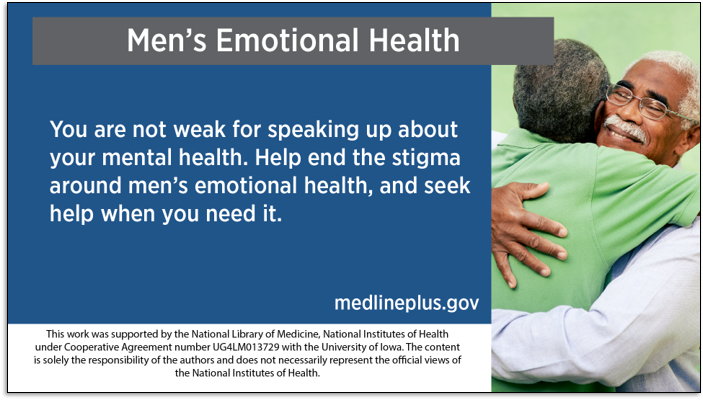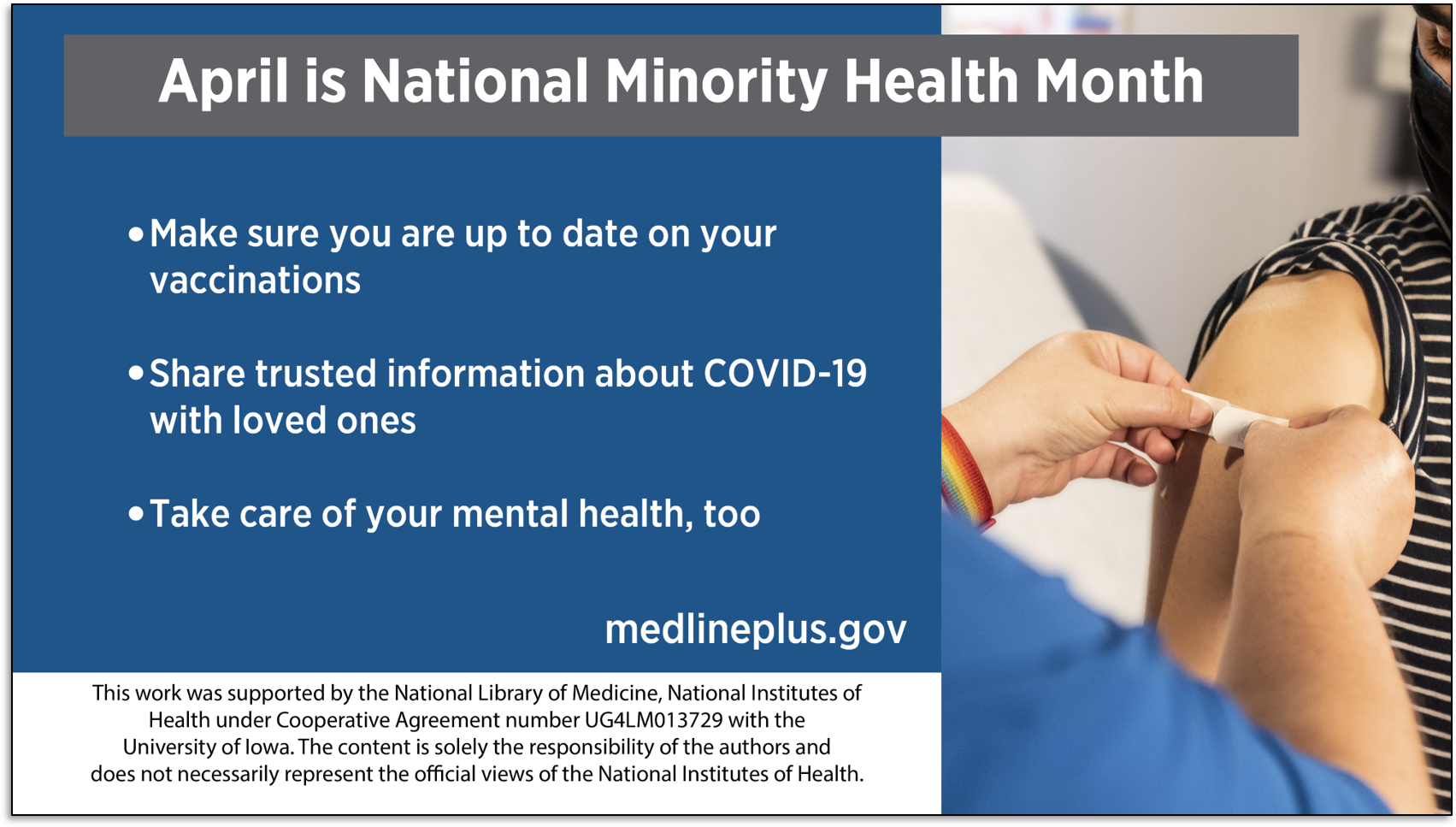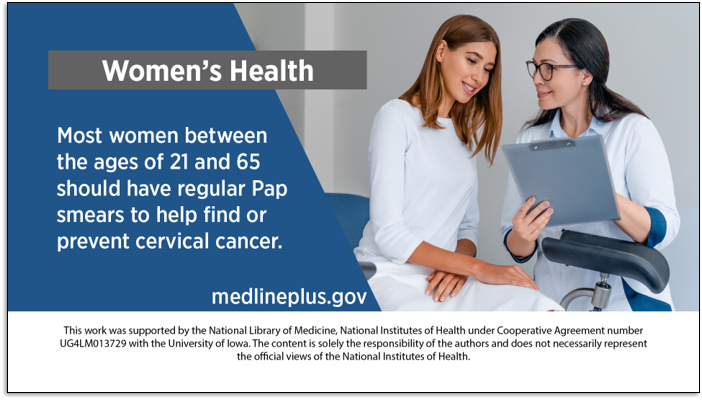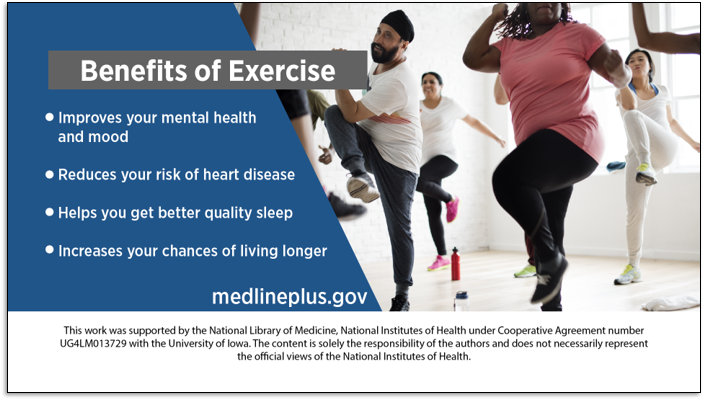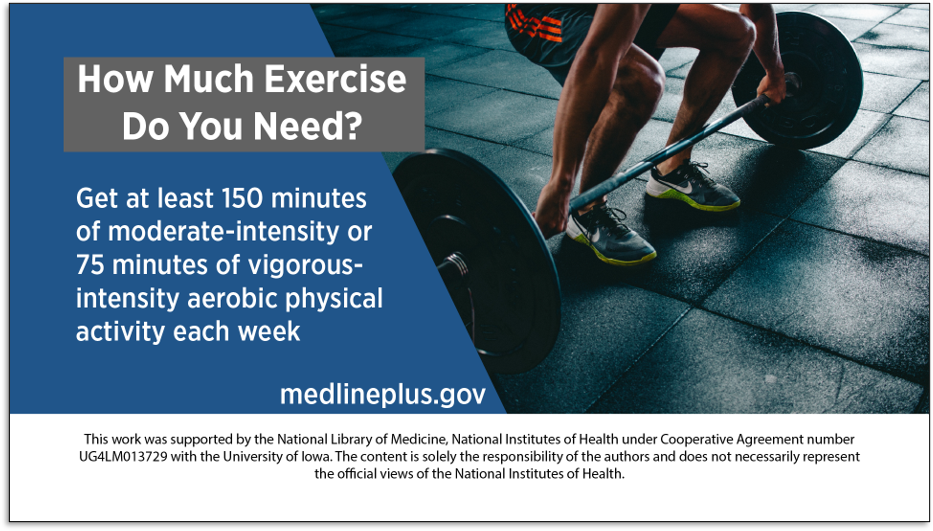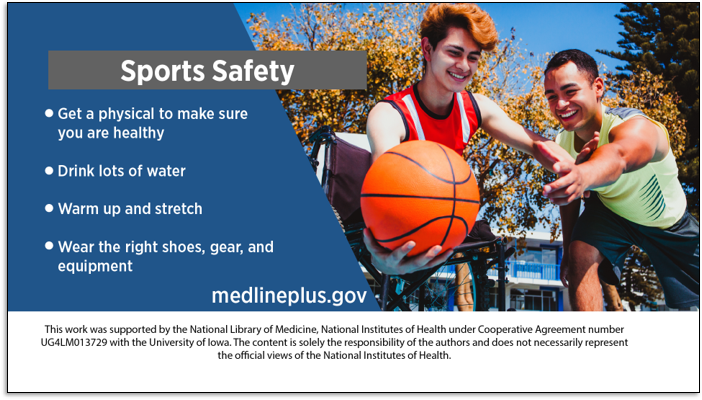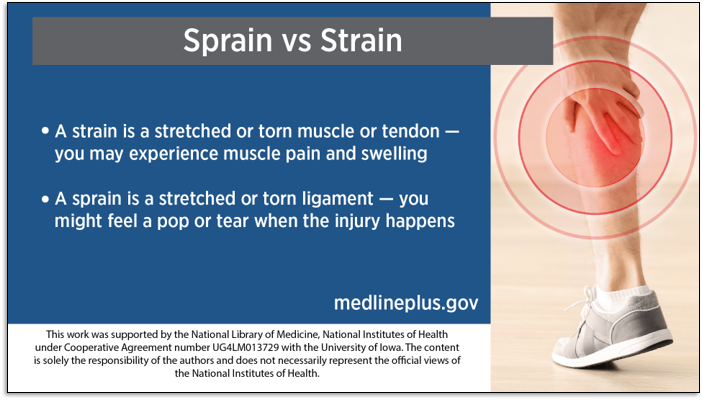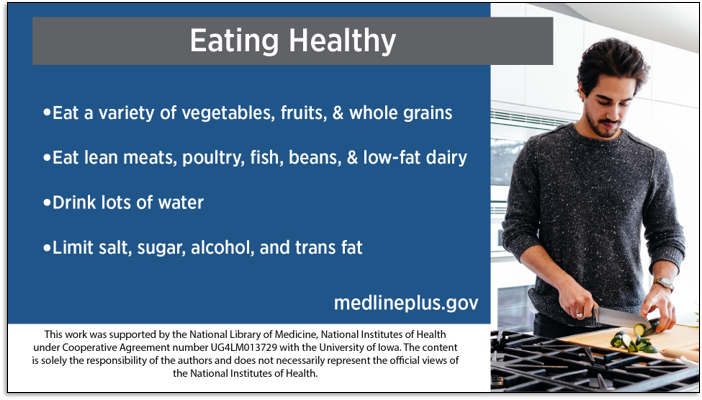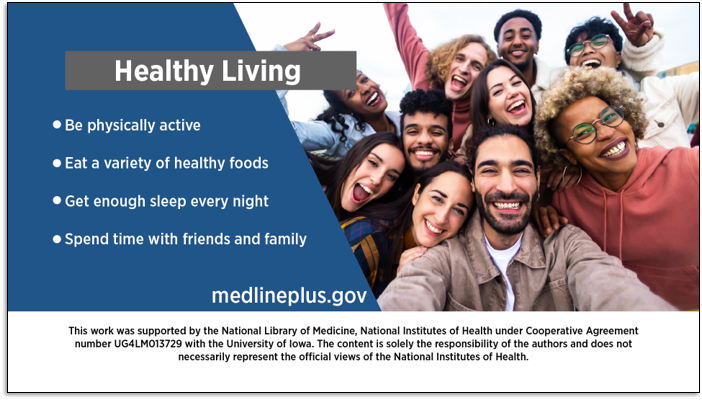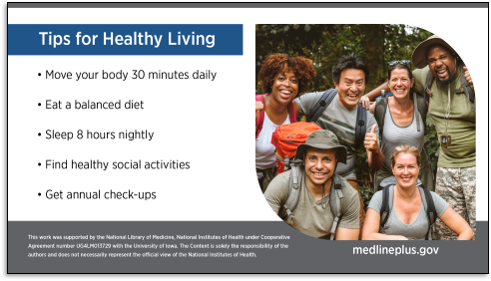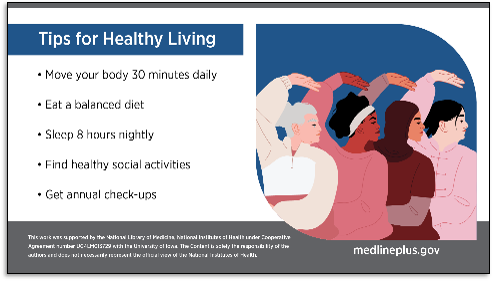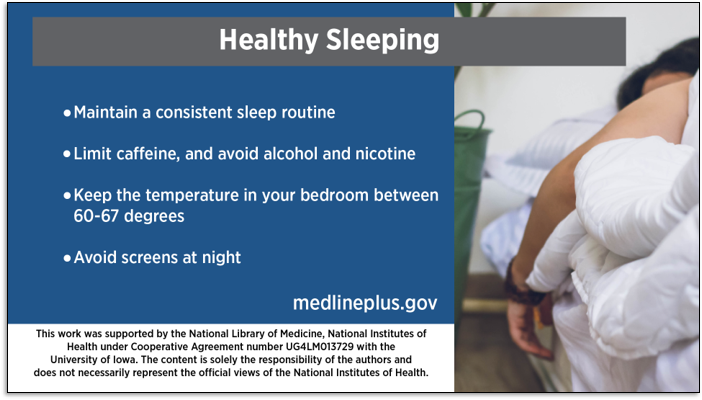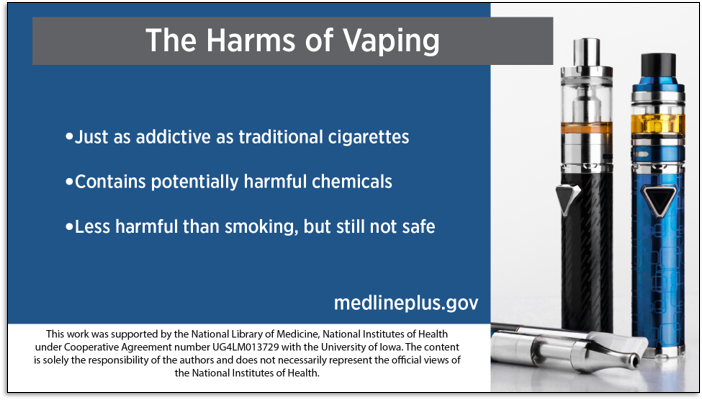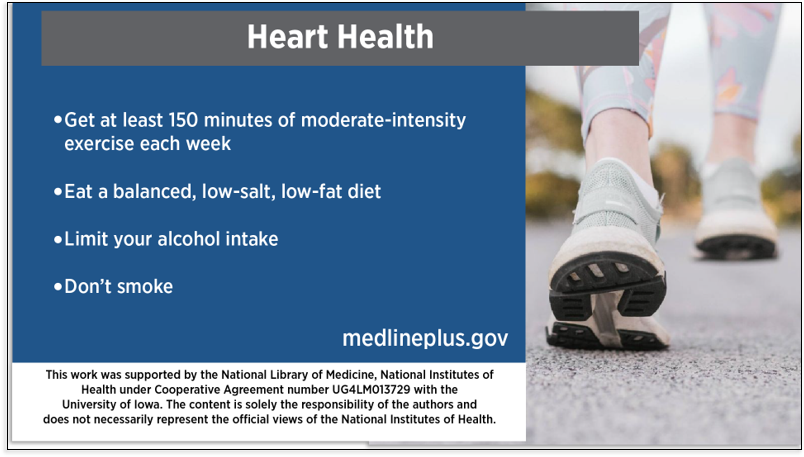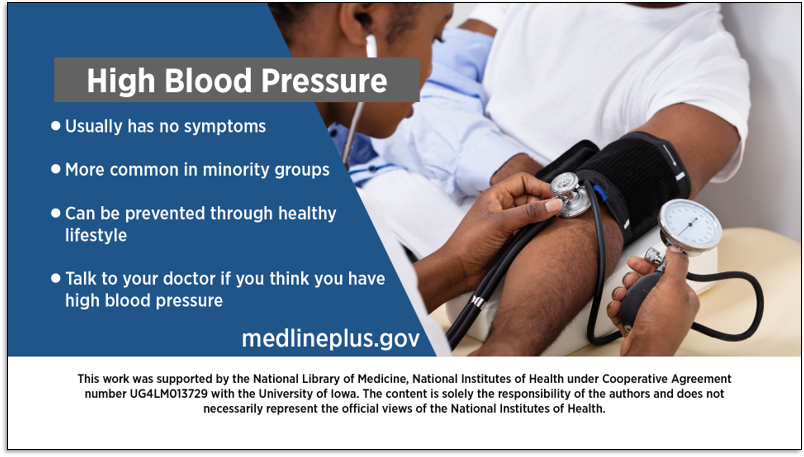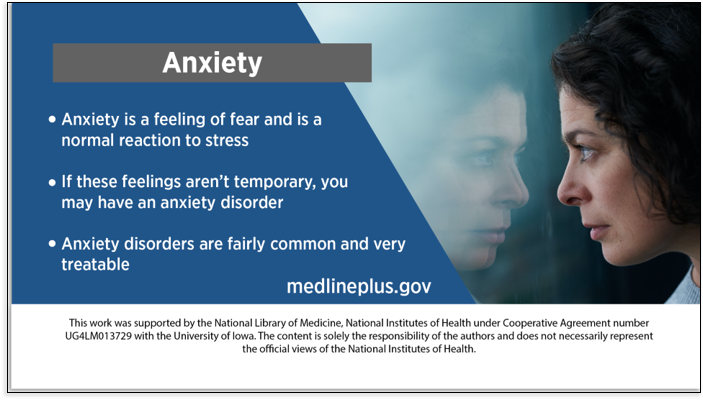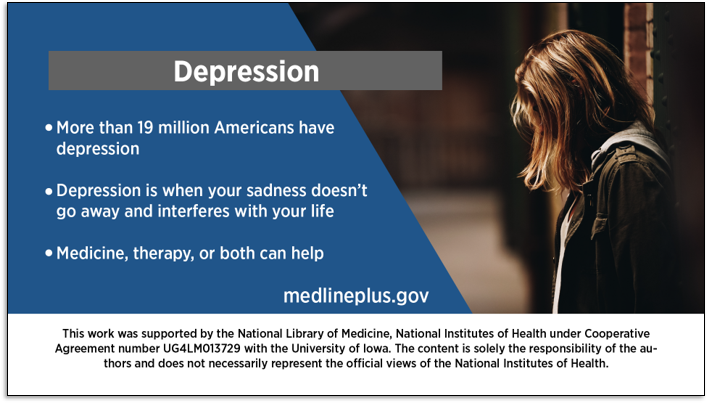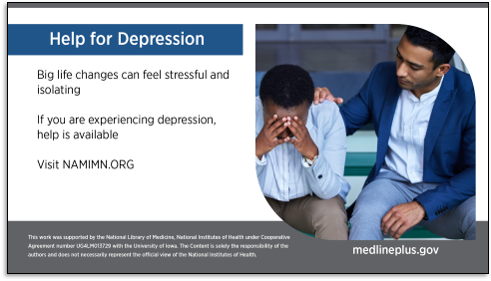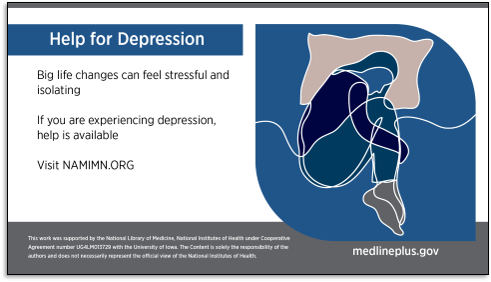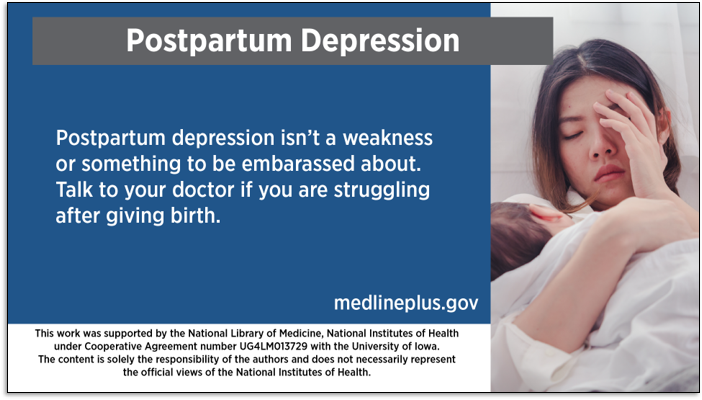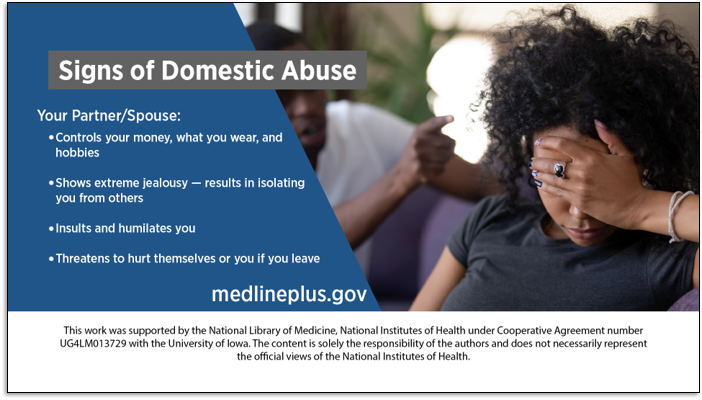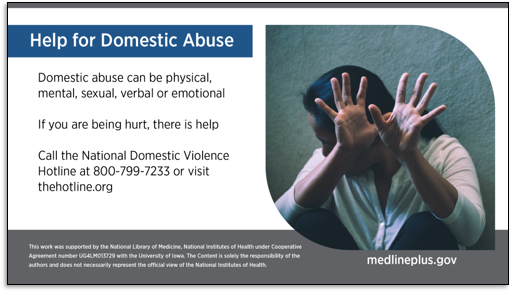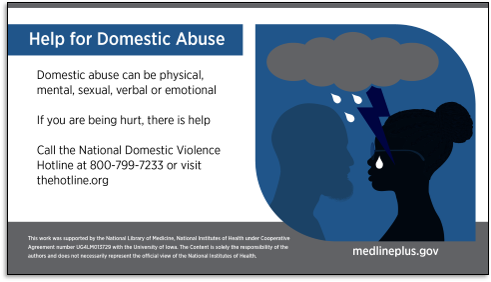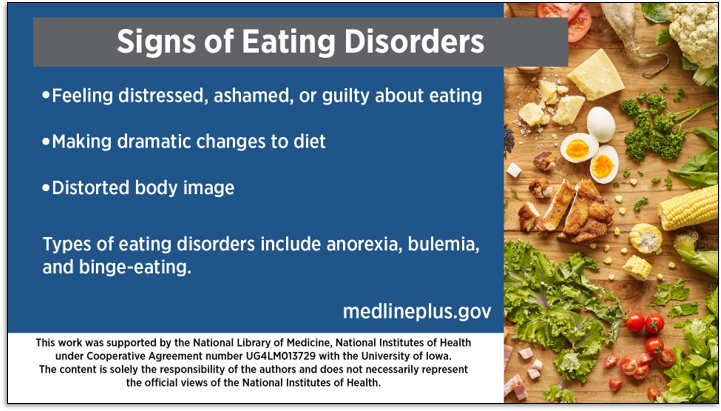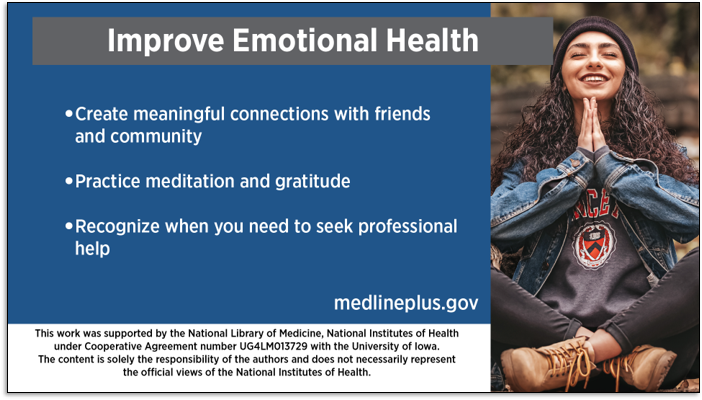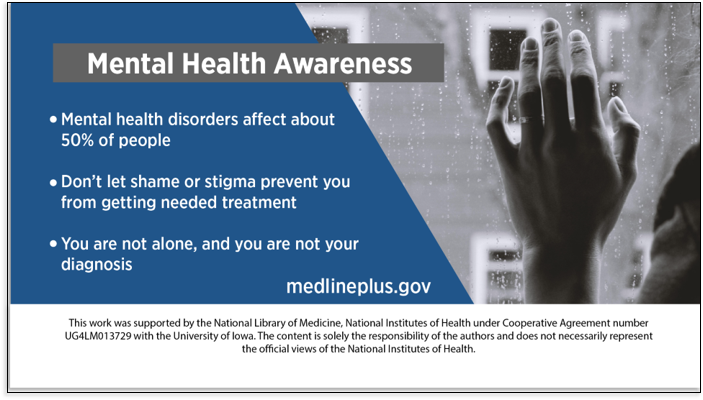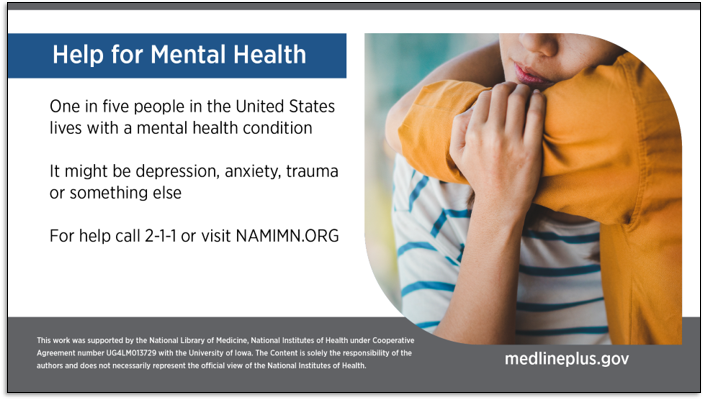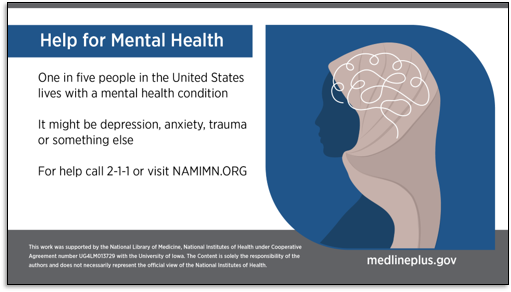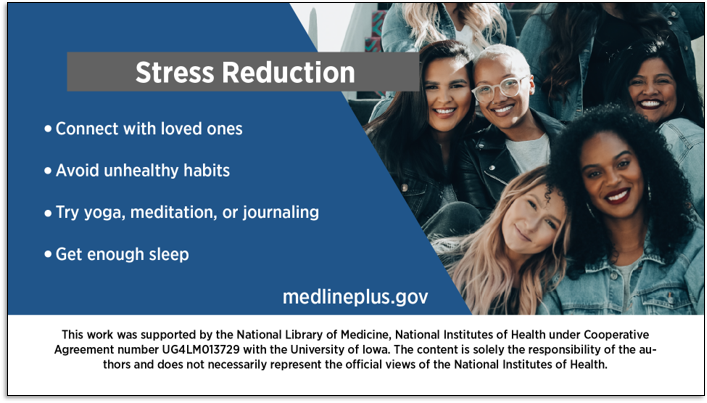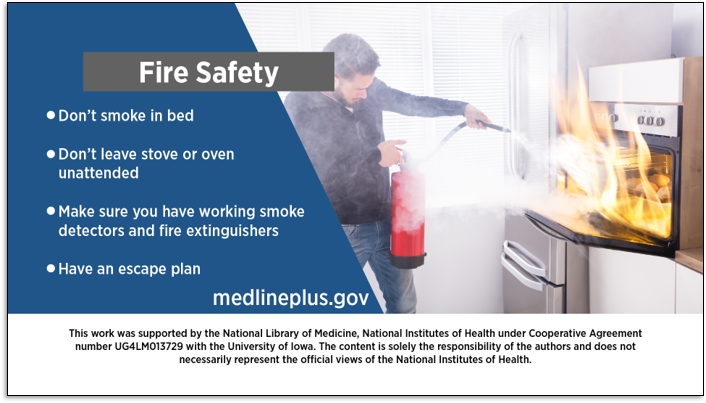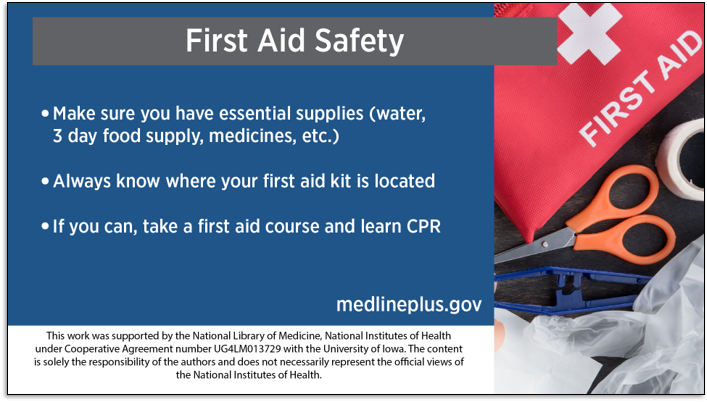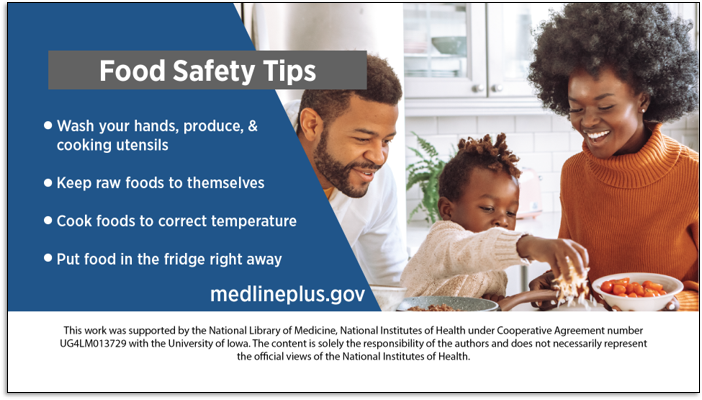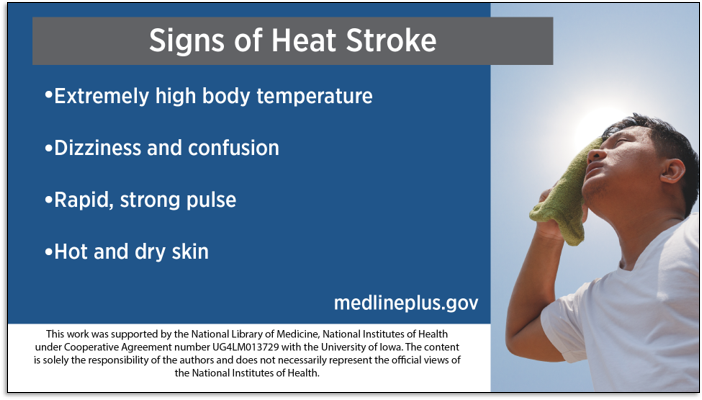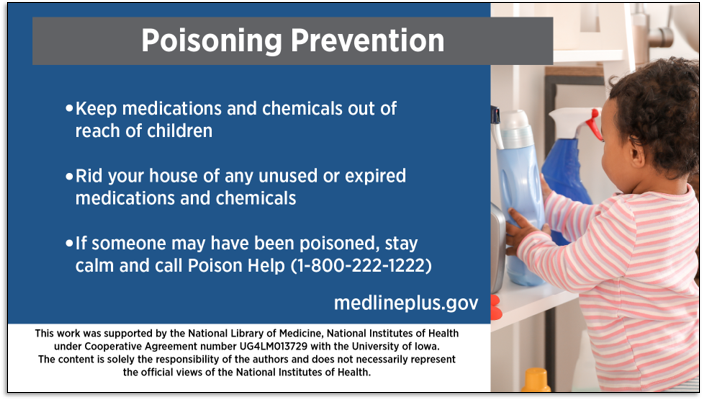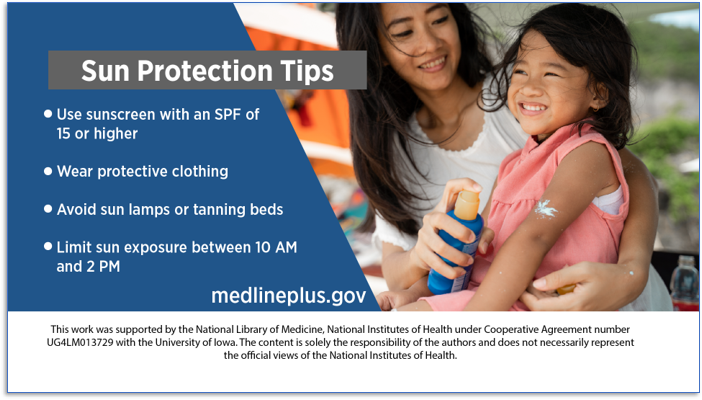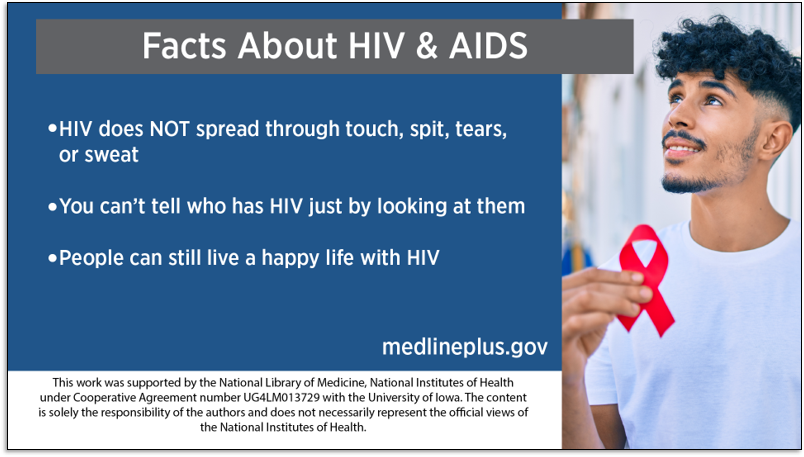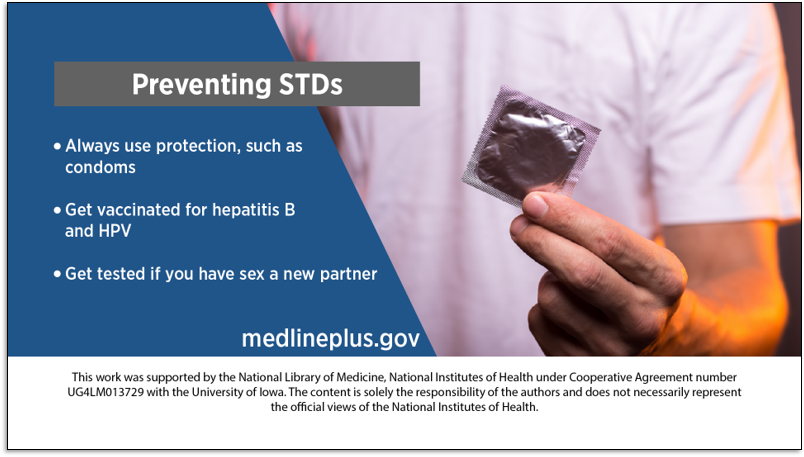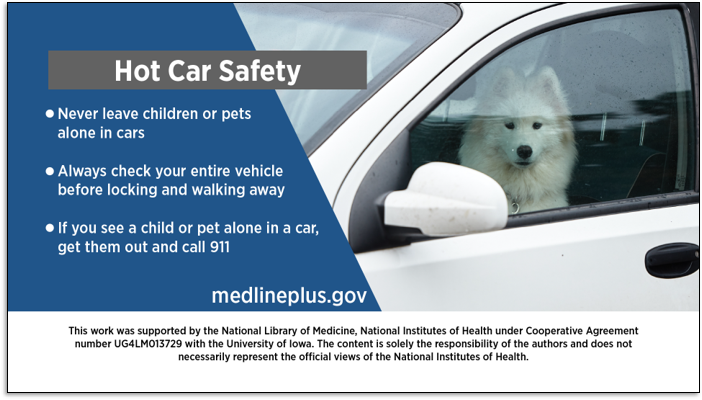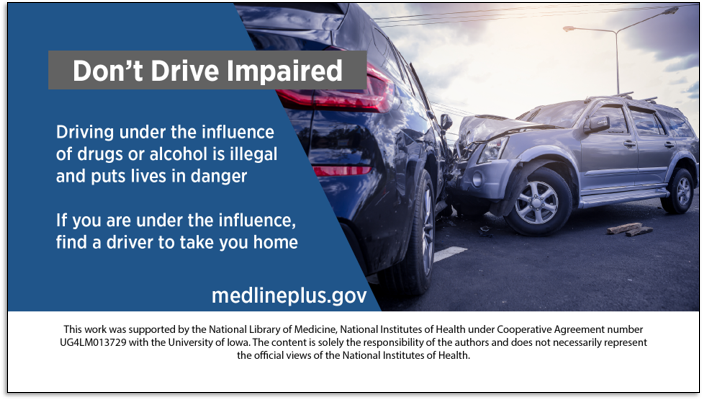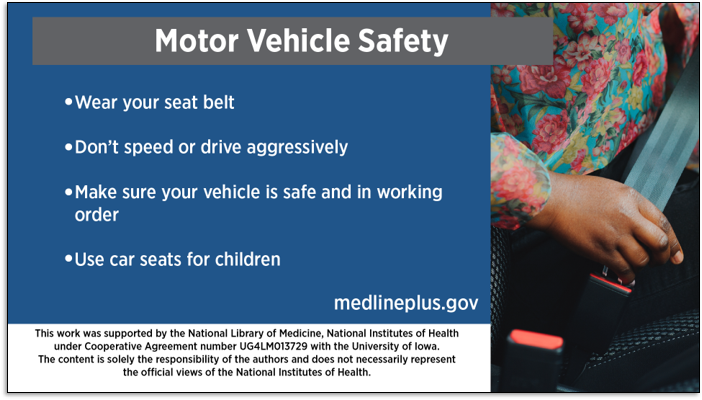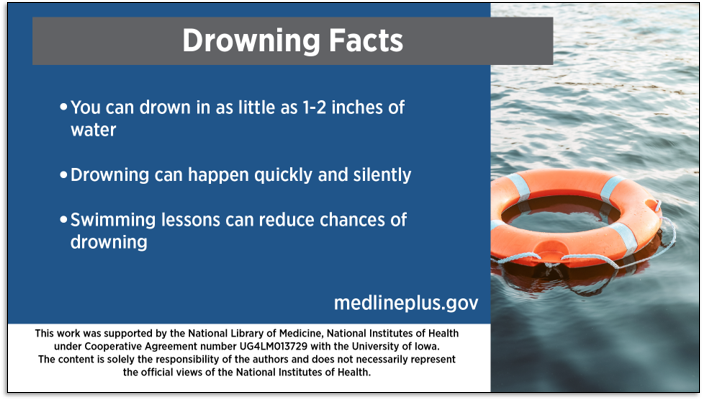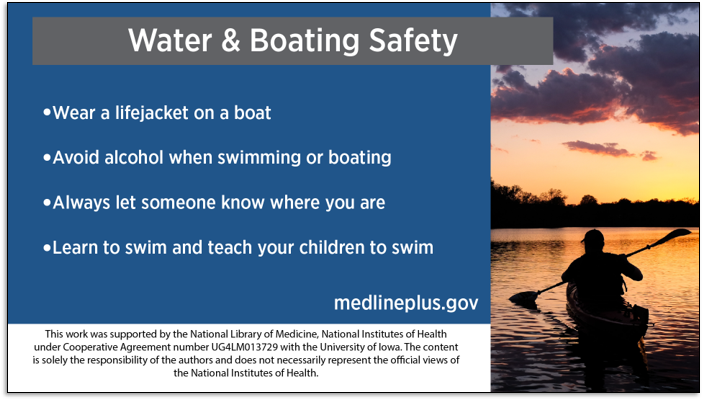
About the Project
TPT NOW, a public emergency streaming service of Twin Cities Public Broadcasting Station, applied and received funding from the Network of the National Library of Medicine (NNLM) Region 6 to develop culturally relevant infographics and videos to improve access to reliable, actionable health information that helps historically marginalized communities make informed decisions about their health. TPT NOW searched MedlinePlus, a free and easy-to-use consumer health information resource from the National Library of Medicine. Then they collaborated with their cultural community partners to prepare public service announcements in different languages including Spanish (Español), Hmong (Hmoob), Somali (Af-Soomaali), and English for the Minneapolis-St. Paul metropolitan area.
How to Use
Now the graphics and videos are publicly available for you to use in your own community! They're designed for both broadcast and social media. NNLM Multilingual Health Media can enhance engagement with and access to MedlinePlus.
You will discover:
- 51 health topics
- 264 infographics (1920x1080 pixels with 96 dpi resolution)
- 20 videos (MP4 files)
- 4 languages (Spanish, Hmong, Somali and English)
What is addiction?
For much of the past century, scientists studying drugs and drug use labored in the shadows of powerful myths and misconceptions about the nature of addiction. When scientists began to study addictive behavior in the 1930s, people with an addiction were thought to be morally flawed and lacking in willpower. Those views shaped society’s responses to drug use, treating it as a moral failing rather than a health problem, which led to an emphasis on punishment rather than prevention and treatment.
- Learn more from the National Institute on Drug Abuse
Videos
- Video English MP4 Help for Addiction
- 28.11 MiB, video/mp4
- Video Hmong (Hmoob) MP4 Help for Addiction
- 48.24 MiB, video/mp4
- Video Somali (Af-Soomaali) MP4 Help for Addiction
- 41.1 MiB, video/mp4
- Video Spanish (Español) MP4 Help for Addiction
- 27.62 MiB, video/mp4
What is autism spectrum disorder?
Autism spectrum disorder (ASD) is a neurological and developmental disorder that begins early in childhood and lasts throughout a person's life. It affects how a person acts and interacts with others, communicates, and learns. It includes what used to be known as Asperger syndrome and pervasive developmental disorders.
It is called a "spectrum" disorder because people with ASD can have a range of symptoms. People with ASD might have problems talking with you, or they might not look you in the eye when you talk to them. They may also have restricted interests and repetitive behaviors. They may spend a lot of time putting things in order, or they may say the same sentence again and again. They may often seem to be in their "own world."
- Learn more from MedlinePlus
What is testicular cancer?
Testicles, or testes, make male hormones and sperm. They are two egg-shaped organs inside the scrotum, the loose sac of skin behind the penis. You can get cancer in one or both testicles.
Testicular cancer mainly affects young men between the ages of 20 and 39. It is also more common in men who:
- Have had abnormal testicle development
- Have had an undescended testicle
- Have a family history of the cancer
Symptoms include pain, swelling, or lumps in your testicles or groin area. Doctors use a physical exam, lab tests, imaging tests, and a biopsy to diagnose testicular cancer. Most cases can be treated, especially if found early. Treatment options include surgery, radiation, and/or chemotherapy. Regular exams after treatment are important.
- Learn more from MedlinePlus
What is diabetes?
Diabetes is a disease in which your blood glucose, or blood sugar, levels are too high. Glucose comes from the foods you eat. Insulin is a hormone that helps the glucose get into your cells to give them energy. With type 1 diabetes, your body does not make insulin. With type 2 diabetes, the more common type, your body does not make or use insulin well. Without enough insulin, the glucose stays in your blood. You can also have prediabetes. This means that your blood sugar is higher than normal but not high enough to be called diabetes. Having prediabetes puts you at a higher risk of getting type 2 diabetes.
Over time, having too much glucose in your blood can cause serious problems. It can damage your eyes, kidneys, and nerves. Diabetes can also cause heart disease, stroke and even the need to remove a limb. Pregnant women can also get diabetes, called gestational diabetes.
- Learn more from MedlinePlus
What is heartburn?
Heartburn is a painful burning feeling in your chest or throat. It happens when stomach acid backs up into your esophagus, the tube that carries food from your mouth to your stomach.
If you have heartburn more than twice a week, you may have GERD. But you can have GERD without having heartburn.
Pregnancy, certain foods, alcohol, and some medications can bring on heartburn. Treating heartburn is important because over time reflux can damage the esophagus.
Over-the-counter medicines may help. If the heartburn continues, you may need prescription medicines or surgery.
If you have other symptoms such as crushing chest pain, it could be a heart attack. Get help immediately.
- Learn more from MedlinePlus
What is obesity?
Obesity means having too much body fat. It is different from being overweight, which means weighing too much. The weight may come from muscle, bone, fat, and/or body water. Both terms mean that a person's weight is greater than what's considered healthy for his or her height.
Obesity happens over time when you eat more calories than you use. The balance between calories-in and calories-out differs for each person. Factors that might affect your weight include your genetic makeup, overeating, eating high-fat foods, and not being physically active.
Obesity increases your risk of diabetes, heart disease, stroke, arthritis, and some cancers. If you have obesity, losing even 5 to 10% of your weight can delay or prevent some of these diseases. For example, that means losing 10 to 20 pounds if you weigh 200 pounds.
- Learn more from MedlinePlus
Allergens Overview
Allergies arise if the body's immune system overreacts to certain foreign substances (allergens) that are normally harmless in most people.
Common allergens include pollens, fungal spores, house-dust mites, and animal epithelial materials but can also include drugs, biologic products, and insect venoms.
How a person reacts to an allergen depends on how they come in contact with it. In many people, allergic reactions occur on the skin and in the airways and mucous membranes. Symptoms usually start quickly after contact with the allergen. In some cases, it takes a few hours or days for the reaction to happen. Symptoms can be mild or a real nuisance with a considerable effect on everyday life.
- Learn more from the National Institute of Environmental Health Sciences
What are allergies?
An allergy is a reaction by your immune system to something that does not bother most other people. People who have allergies often are sensitive to more than one thing. Substances that often cause reactions are:
Normally, your immune system fights germs. It is your body's defense system. In most allergic reactions, however, it is responding to a false alarm. Genes and the environment probably both play a role.
- Learn more at MedlinePlus
What are seasonal allergies?
If you have an allergy, your immune system reacts to something that doesn’t bother most other people. People with seasonal allergies (also called hay fever or allergic rhinitis) react to pollen from plants. Symptoms may include sneezing, coughing, a runny or stuffy nose, and itching in the eyes, nose, mouth, and throat.
This page discusses complementary health approaches for allergic rhinitis. Another page on the National Center for Complementary and Integrative Health (NCCIH) website has information on complementary approaches for asthma.
- Learn more from the National Center for Complementary and Integrative Health
What is asthma?
Asthma is a chronic (long-term) lung disease. It affects your airways, the tubes that carry air in and out of your lungs. When you have asthma, your airways can become inflamed and narrowed. This can cause wheezing, coughing, and tightness in your chest. When these symptoms get worse than usual, it is called an asthma attack or flare-up.
What causes asthma?
The exact cause of asthma is unknown. Genetics and your environment likely play a role in who gets asthma.
- Learn more from MedlinePlus
What is brain health?
Research is still evolving, but evidence is strong that people can reduce their risk of cognitive decline by making key lifestyle changes, including participating in regular physical activity, staying socially engaged, and maintaining good heart health.
- Learn more from the Alzheimer's Association
What is eye health?
Your eyes are an important part of your health. Most people rely on their eyes to see and make sense of the world around them. But some eye diseases can lead to vision loss, so it is important to identify and treat eye diseases as early as possible. You should get your eyes checked as often as your health care provider recommends it, or if you have any new vision problems. And just as it is important to keep your body healthy, you also need to keep your eyes healthy.
- Learn more from MedlinePlus
What is renal health?
You can protect your kidneys by preventing or managing health conditions that cause kidney damage, such as diabetes and high blood pressure. The steps described below may help keep your whole body healthy, including your kidneys.
During your next medical visit, you may want to ask your health care provider about your kidney health. Early kidney disease may not have any symptoms, so getting tested may be the only way to know your kidneys are healthy. Your health care provider will help decide how often you should be tested.
- Learn more from the National Institute of Diabetes and Digestive and Kidney Diseases
What is dental health?
It's important to take care of your mouth and teeth starting in childhood. If you don't, you could have problems with your teeth and gums - like cavities or even tooth loss.
Here's how to keep your mouth and teeth healthy:
- Brush your teeth twice a day with a fluoride toothpaste
- Clean between your teeth every day with floss or another type of between-the-teeth cleaner
- Snack smart - limit sugary snacks
- Don't smoke or chew tobacco
- See your dentist or oral health professional regularly
- Learn more from MedlinePlus
What is arthritis?
If you feel pain and stiffness in your body or have trouble moving around, you might have arthritis. Most kinds of arthritis cause pain and swelling in your joints. Joints are places where two bones meet, such as your elbow or knee. Over time, a swollen joint can become severely damaged. Some kinds of arthritis can also cause problems in your organs, such as your eyes or skin.
- Learn more from MedlinePlus
What is good posture?
Good posture is about more than standing up straight so you can look your best. It is an important part of your long-term health. Making sure that you hold your body the right way, whether you are moving or still, can prevent pain, injuries, and other health problems.
Posture is how you hold your body. There are two types:
- Dynamic posture is how you hold yourself when you are moving, like when you are walking, running, or bending over to pick up something.
- Static posture is how you hold yourself when you are not moving, like when you are sitting, standing, or sleeping.
- Learn more from MedlinePlus
What are muscle cramps?
Muscle cramps are sudden, involuntary contractions or spasms in one or more of your muscles. They are very common and often occur after exercise. Some people get muscle cramps, especially leg cramps, at night. They can be painful, and they may last a few seconds to several minutes.
- Learn more from MedlinePlus
What is aging?
People in the U.S. are living longer, and the number of older adults in the population is growing. As we age, our minds and bodies change. Having a healthy lifestyle can help you deal with those changes. It may also prevent some health problems and help you to make the most of your life.
- Learn more from MedlinePlus
What is men's health?
Most men need to pay more attention to their health. Compared to women, men are more likely to:
- Smoke and drink
- Make unhealthy or risky choices
- Put off regular checkups and medical care
There are also health conditions that only affect men, such as prostate cancer and low testosterone. Many of the major health risks that men face - like colon cancer or heart disease - can be prevented and treated with early diagnosis. Screening tests can find diseases early, when they are easier to treat. It's important to get the screening tests you need.
- Learn more from MedlinePlus
What is minority health?
The National Institute on Minority Health and Health Disparities (NIMHD) is one of the 27 Institutes and Centers of the National Institutes of Health (NIH), the nation's premiere medical research agency. NIMHD's work touches the lives of millions of Americans burdened by disparities in health status and health care delivery, including racial and ethnic minority groups, rural populations, populations with low socioeconomic status, and other population groups.
- Learn more from OMH
What is women's health?
Women have unique health issues. And some of the health issues that affect both men and women can affect women differently.
Unique issues include pregnancy, menopause, and conditions of the female organs. Women can have a healthy pregnancy by getting early and regular prenatal care. They should also get recommended breast cancer, cervical cancer, and bone density screenings.
Women and men also have many of the same health problems. But these problems can affect women differently. For example,:
- Women are more likely to die following a heart attack than men
- Women are more likely to show signs of depression and anxiety than men
- The effects of sexually transmitted diseases can be more serious in women
- Osteoarthritis affects more women than men
- Women are more likely to have urinary tract problems
- Learn more from MedlinePlus
What are exercise & physical fitness?
Regular exercise is one of the best things you can do for your health. It has many benefits, including improving your overall health and fitness, and reducing your risk for many chronic diseases. There are many different types of exercise; it is important that you pick the right types for you. Most people benefit from a combination of them:
- Endurance, or aerobic, activities increase your breathing and heart rate. They keep your heart, lungs, and circulatory system healthy and improve your overall fitness. Examples include brisk walking, jogging, swimming, and biking.
- Strength, or resistance training, exercises make your muscles stronger. Some examples are lifting weights and using a resistance band.
- Balance exercises can make it easier to walk on uneven surfaces and help prevent falls. To improve your balance, try tai chi or exercises like standing on one leg.
- Flexibility exercises stretch your muscles and can help your body stay limber. Yoga and doing various stretches can make you more flexible.
- Learn more from MedlinePlus
What are the benefits of exercise?
We have all heard it many times before - regular exercise is good for you, and it can help you lose weight. But if you are like many Americans, you are busy, you have a sedentary job, and you haven't yet changed your exercise habits. The good news is that it's never too late to start. You can start slowly, and find ways to fit more physical activity into your life. To get the most benefit, you should try to get the recommended amount of exercise for your age. If you can do it, the payoff is that you will feel better, help prevent or control many diseases, and likely even live longer.
- Learn more from MedlinePlus
How much exercise do you need?
Regular exercise is one of the best things you can do for your health. It has many benefits. It can improve your overall health and fitness and reduce your risk for many chronic diseases.To get the most benefit, here's how much physical activity you should get.
- Learn more from MedlinePlus
What is sports safety?
Playing sports can be fun, but it can also be dangerous if you are not careful. You can help prevent injuries by:
- Getting a physical to make sure you are healthy before you start playing your sport
- Wearing the right shoes, gear, and equipment
- Drinking lots of water
- Warming up and stretching
If you have already hurt yourself playing a sport, make sure you recover completely before you start up again. If possible, protect the injured part of your body with padding, a brace, or special equipment. When you do start playing again, start slowly.
- Learn more from MedlinePlus
What is a sprain vs strain? (Overview of Sports Injuries)
The term “sports injury” refers to the kinds of injuries that most commonly occur during sports or exercise, but they are not limited to athletes. Factory workers get tennis elbow, painters get shoulder injuries, and gardeners develop tendinitis, even though they may not participate in sports. Ultimately, however, “sports injuries” refers to those that occur in active individuals. This health topic focuses on the most common types of sports injuries—those that affect the musculoskeletal system. The musculoskeletal system is the network of muscles, tendons, ligaments, bones, and other tissues that provides the body with stability and enables movement.
- Learn more from MedlinePlus
What is eating healthy?
We make countless decisions every day, both big and small. When it comes to deciding what to eat and feed our families, it can be a lot easier than you might think to make smart, healthy choices. It takes just a little planning.
The foods and drinks we put into our bodies are our fuel. They provide us with energy and nutrients—like vitamins, minerals, and proteins—that our bodies need to function and thrive. Research shows that healthy food and drink choices are especially important for children’s growing bodies and minds. Healthy choices have both immediate and long-lasting benefits for you and your family.
- Learn more from NIH News in Health
What is healthy living?
Many factors affect your health. Some you cannot control, such as your genetic makeup or your age. But you can make changes to your lifestyle. By taking steps toward healthy living, you can help reduce your risk of heart disease, cancer, stroke and other serious diseases.
- Learn more from MedlinePlus
Videos
- Video English MP4 Healthy Living
- 28.46 MiB, video/mp4
- Video Hmong (Hmoob) MP4 Healthy Living
- 1.5 MiB, video/mp4
- Video Somali (Af-Soomaali) MP4 Healthy Living
- 41.85 MiB, video/mp4
- Video Spanish (Español) MP4 Healthy Living
- 31.06 MiB, video/mp4
What is healthy sleep?
While you are sleeping, you are unconscious, but your brain and body functions are still active. Sleep is a complex biological process that helps you process new information, stay healthy, and feel rested.
During sleep, your brain cycles through five stages: stage 1, 2, 3, 4, and rapid eye movement (REM) sleep. Different things happen during each stage. For example, you have a different pattern of brain waves during each one. Your breathing, heart, and temperature may be slower or faster in some stages. Certain phases of sleep help you :
- Feel rested and energetic the next day
- Learn information, get insight, and form memories
- Give your heart and vascular system a rest
- Release more growth hormone, which helps children grow. It also boosts muscle mass and the repair of cells and tissues in children and adults.
- Release sex hormones, which contributes to puberty and fertility
- Keep from getting sick or help you get better when you are sick, by creating more cytokines (hormones that help the immune system fight various infections)
You need all of the stages to get a healthy sleep.
- Learn more from MedlinePlus
What is vaping?
You’ve probably heard a lot about vaping lately. You might also know about the recent outbreak of lung injuries and deaths linked to vaping in the U.S. But those aren’t the only risks that come with vaping. Here’s what you need to know.
Vaping devices, also known as e-cigarettes, vape pens, and e-hookahs among other terms, come in many shapes and sizes. Some look like traditional cigarettes, cigars, or pipes. Others are shaped like every-day objects, such as pens or USB memory sticks.
- Learn more from NIH News in Health
What is heart health?
Heart disease is the leading cause of the death in the United States. It is also a major cause of disability. There are many things that can raise your risk for heart disease. They are called risk factors. Some of them you cannot control, but there are many that you can control. Learning about them can lower your risk of heart disease.
- Learn more from MedlinePlus
What is high blood pressure/hypertension?
More than 1 in 3 adults in the U.S. has high blood pressure, or hypertension. Many of those people don't know they have it, because there are usually no warning signs. This can be dangerous, because high blood pressure can lead to life-threatening conditions like heart attack or stroke. The good news is that you can often prevent or treat high blood pressure. Early diagnosis and heart-healthy lifestyle changes can keep high blood pressure from seriously damaging your health.
- Learn more from MedlinePlus
Mental Health Overview
Mental health includes our emotional, psychological, and social well-being. It affects how we think, feel, and act as we cope with life. It also helps determine how we handle stress, relate to others, and make choices. Mental health is important at every stage of life, from childhood and adolescence through adulthood and aging.
- Learn more from MedlinePlus about Mental Health & Behavior
What is anxiety?
Anxiety is a feeling of fear, dread, and uneasiness. It might cause you to sweat, feel restless and tense, and have a rapid heartbeat. It can be a normal reaction to stress. For example, you might feel anxious when faced with a difficult problem at work, before taking a test, or before making an important decision. It can help you to cope. The anxiety may give you a boost of energy or help you focus. But for people with anxiety disorders, the fear is not temporary and can be overwhelming.
- Learn more from MedlinePlus
What is depression?
Depression is a serious medical illness. It's more than just a feeling of being sad or "blue" for a few days. If you are one of the more than 19 million teens and adults in the United States who have depression, the feelings do not go away. They persist and interfere with your everyday life. Symptoms can include: Feeling sad or "empty" Loss of interest in favorite activities Overeating, or not wanting to eat at all Not being able to sleep, or sleeping too much Feeling very tired Feeling hopeless, irritable, anxious, or guilty Aches or pains, headaches, cramps, or digestive problems Thoughts of death or suicide.
- Learn more from MedlinePlus
Videos
- Video English MP4 Depression
- 28.46 MiB, video/mp4
- Video Hmong (Hmoob) MP4 Depression
- 41.34 MiB, video/mp4
- Video Somali (Af-Soomaali) MP4 Depression
- 40.36 MiB, video/mp4
- Video Spanish (Español) MP4 Depression
- 31.81 MiB, video/mp4
What is postpartum depression?
Your body and mind go through many changes during and after pregnancy. If you feel empty, emotionless, or sad all or most of the time for longer than 2 weeks during or after pregnancy, reach out for help. If you feel like you don't love or care for your baby, you might have postpartum depression. Treatment for depression, such as therapy or medicine, works and will help you and your baby be as healthy as possible in the future.
- Learn more from the Office of the Assistant Secretary for Health (OASH) Office on Woment's Health
What is domestic abuse (IPV)?
Intimate partner violence (IPV) is abuse that happens in a romantic relationship. The intimate partner could be a current or former spouse or dating partner. IPV is also known as domestic violence.
IPV may include different types of abuse...
- Learn more from MedlinePlus
Videos
- Video English MP4 Domestic Abuse
- 29.59 MiB, video/mp4
- Video Hmong (Hmoob) MP4 Domestic Abuse
- 48.66 MiB, video/mp4
- Video Somali (Af-Soomaali) MP4 Domestic Abuse
- 51.1 MiB, video/mp4
- Video Spanish (Español) MP4 Domestic Abuse
- 31.93 MiB, video/mp4
What are eating disorders?
Eating disorders are serious mental health disorders. They involve severe problems with your thoughts about food and your eating behaviors. You may eat much less or much more than you need.
Eating disorders are medical conditions; they are not a lifestyle choice. They affect your body's ability to get proper nutrition. This can lead to health issues, such as heart and kidney problems, or sometimes even death. But there are treatments that can help.
- Learn more from MedlinePlus
What is emotional health?
Emotional health is an important part of overall health. People who are emotionally healthy are in control of their thoughts, feelings, and behaviors. They’re able to cope with life’s challenges. They can keep problems in perspective and bounce back from setbacks. They feel good about themselves and have good relationships.
- Learn more from FamilyDoctor.org
What is mental health?
Mental health includes our emotional, psychological, and social well-being. It affects how we think, feel, and act as we cope with life. It also helps determine how we handle stress, relate to others, and make choices. Mental health is important at every stage of life, from childhood and adolescence through adulthood and aging.
- Learn more from MedlinePlus
Videos
- Video English MP4 Mental Health Awareness
- 30.79 MiB, video/mp4
- Video Hmong (Hmoob) MP4 Mental Health Awareness
- 56.81 MiB, video/mp4
- Video Somali (Af-Soomaali) MP4 Mental Health Awareness
- 35.92 MiB, video/mp4
- Video Spanish (Español) MP4 Mental Health Awareness
- 32.13 MiB, video/mp4
What is stress?
Stress is how your brain and body respond to a challenge or demand. When you are stressed, your body releases chemicals called hormones. The hormones make you alert and ready to act. They can raise your blood pressure, heart rate, and blood sugar levels. This response is sometimes called a "fight or flight" response.
Everyone gets stressed from time to time. There are different types of stress. It can be short-term or long-term. It can be caused by something that happens once or something that keeps happening.
- Learn more from MedinePlus
Safety/Accident Prevention Overview
You can't remove all the safety hazards from your life, but you can reduce them. To avoid many major hazards and prepare for emergencies:
- Keep emergency phone numbers by your telephones
- Make a first aid kit for your home
- Make a family emergency plan
- Install and maintain smoke alarms and carbon monoxide detectors
- Keep guns unloaded and locked up. Lock up the ammunition separately.
- Follow the directions carefully when using tools or equipment
Young children are especially at risk. Supervision is the best way to keep them safe. Childproofing the house can also help.
- Learn more from MedlinePlus
What is fire safety, also known as fire prevention?
Preventing fires is an important part of fire safety. In the United States, cooking is the main cause of home fires. Cigarettes are a big risk too - they are the leading cause of fire deaths. Here are some fire prevention tips:
- Don't leave the stove or oven unattended when they are on
- Don't let children use kitchen appliances unsupervised
- Don't smoke in bed
- Make sure your electrical appliances and cords are in good condition
It is also important to be prepared in case there is a fire. Make sure that you have working smoke detectors on every floor and in every bedroom. You should also have fire extinguishers on every floor and in your kitchen. Make and practice an escape plan in case the main exit is blocked.
- Learn more from MedlinePlus
What is first aid?
Accidents happen. Someone chokes on an ice cube or gets stung by a bee. It is important to know when to call 911 -- it is for life-threatening emergencies. While waiting for help to arrive, you may be able to save someone's life. Cardiopulmonary resuscitation (CPR) is for people whose hearts or breathing has stopped and the Heimlich maneuver is for people who are choking.
You can also learn to handle common injuries and wounds. Cuts and scrapes, for example, should be rinsed with cool water. To stop bleeding, apply firm but gentle pressure, using gauze. If blood soaks through, add more gauze, keeping the first layer in place. Continue to apply pressure.
It is important to have a first aid kit available. Keep one at home and one in your car. It should include a first-aid guide. Read the guide to learn how to use the items, so you are ready in case an emergency happens.
- Learn more from MedlinePlus
What is food safety?
Safe steps in food handling, cooking, and storage can prevent foodborne illness. There are four basic steps to food safety at home:
- Clean - always wash your fruits and vegetables, hands, counters, and cooking utensils.
- Separate - keep raw foods to themselves. Germs can spread from one food to another.
- Cook - foods need to get hot and stay hot. Heat kills germs.
- Chill - put fresh food in the refrigerator right away.
In the grocery store, avoid cans that are bulging or jars that have cracks or loose lids. Check packages to be sure food hasn't reached its expiration date.
- Learn more from MedlinePlus
What is heat stroke/heat illness?
Your body normally cools itself by sweating. During hot weather, especially when it is very humid, sweating just isn't enough to cool you off. Your body temperature can rise to dangerous levels and you can develop a heat illness.
Most heat illnesses happen when you stay out in the heat too long. Exercising and working outside in high heat can also lead to heat illness. Older adults, young children, and those who are sick or overweight are most at risk. Taking certain medicines or drinking alcohol can also raise your risk.
- Learn more from MedlinePlus
What are poisons?
A poison is any substance that is harmful to your body. You might swallow it, inhale it, inject it, or absorb it through your skin. Any substance can be poisonous if too much is taken. Poisons can include:
- Prescription or over-the-counter medicines taken in doses that are too high
- Overdoses of illegal drugs
- Carbon monoxide from gas appliances
- Household products, such as laundry powder or furniture polish
- Pesticides
- Indoor or outdoor plants
- Metals such as lead and mercury
The effects of poisoning range from short-term illness to brain damage, coma, and death. To prevent poisoning it is important to use and store products exactly as their labels say. Keep dangerous products where children can't get to them. Treatment for poisoning depends on the type of poison. If you suspect someone has been poisoned, call your local poison control center at 1-800-222-1222 right away.
- Learn more from MedlinePlus
What is sun safety?
Spending time outside is a great way to be physically active, reduce stress, and get vitamin D. You can work and play outside without raising your skin cancer risk by protecting your skin from the sun.
Most skin cancers are caused by too much exposure to ultraviolet (UV) light. UV rays are an invisible kind of radiation that comes from the sun, tanning beds, and sunlamps. UV rays can damage skin cells.
Protection from UV rays is important all year, not just during the summer. UV rays can reach you on cloudy and cool days, and they reflect off of surfaces like water, cement, sand, and snow. In the continental United States, UV rays tend to be strongest from 10 a.m. to 4 p.m. daylight saving time (9 a.m. to 3 p.m. standard time).
Sun Safety Facts from the CDC
- Sun Safety Facts
- Seguridad del sol (Spanish/Español)
What is sexual health?
Sexuality is a big part of being human. Love, affection and sexual intimacy all play a role in healthy relationships. They also contribute to your sense of well-being. A number of disorders can affect the ability to have or enjoy sex in both men and women.
Factors that can affect sexual health include:
- Fear of unplanned pregnancy
- Concerns about infertility
- Sexually transmitted diseases
- Chronic diseases such as cancer or heart disease
- Medicines that affect sexual desire or performance
- Learn more at MedlinePlus
What is HIV and AIDS?
What is HIV?
HIV stands for human immunodeficiency virus. It harms your immune system by destroying a type of white blood cell that helps your body fight infection. This puts you at risk for serious infections and certain cancers.
What is AIDS?
AIDS stands for acquired immunodeficiency syndrome. It is the final stage of infection with HIV. It happens when the body's immune system is badly damaged because of the virus. Not everyone with HIV develops AIDS.
- Learn more at MedlinePlus
What are sexually transmitted diseases (STDs)?
Sexually transmitted diseases (STDs), or sexually transmitted infections (STIs), are infections that are passed from one person to another through sexual contact. The contact is usually vaginal, oral, or anal sex. But sometimes they can spread through other intimate physical contact. This is because some STDs, like herpes and HPV, are spread by skin-to-skin contact.
- Learn more at MedlinePlus
What is hot car safety?
Children who are left unattended in vehicles while a parent or caregiver runs a quick errand—or when a child becomes trapped in a vehicle can result in serious injuries or death. The American College of Emergency Physicians (ACEP) wants you to be aware of how dangerous leaving unattended children in hot cars can be.
According to the National Safety Council on average, 38 children under the age of 15 die each year from heatstroke after being left in a vehicle. Small children are especially at risk for heatstroke when left alone in a car because their bodies heat up almost five times faster than adults. Children develop heatstroke at when their internal body temperature reaches 104 degrees, and death can occur at 107 degrees.
- Learn more from EmergencyPhysicians.org
What is impaired driving?
Impaired driving is dangerous. It's the cause of more than half of all car crashes. It means operating a motor vehicle while you are affected by:
- Alcohol
- Legal or illegal drugs
- Sleepiness
- Distractions, such as using a cell phone or texting
- Having a medical condition which affects your driving
For your safety and the safety of others, do not drive while impaired. Have someone else drive you or take public transportation when you cannot drive. If you need to take a call or send a text message, pull over.
- Learn more from MedlinePlus
What is motor vehicle safety?
Every year thousands of people in the U.S. die from motor vehicle crashes. Trying to prevent these crashes is one part of motor vehicle safety. Here are some things you can do to be safer on the road:
- Make sure your vehicle is safe and in working order
- Use car seats for children
- Wear your seat belt
- Don't speed or drive aggressively
- Don't drive impaired
Safety also involves being aware of others. Share the road with bicycles and motorcycles, and watch for pedestrians.
- Learn more from MedlinePlus
What is water safety?
Water safety tips for all ages include:
- Learn CPR.
- Never swim alone.
- Never dive into water unless you know beforehand how deep it is.
- Know your limits. Do not go into areas of water that you cannot handle.
- Stay out of strong currents even if you are a strong swimmer.
- Learn about rip currents and undertows and how to swim out of them.
- Always wear life preservers when boating, even if you know how to swim.
- Do not overload your boat. If your boat turns over, stay with the boat until help arrives.
Do not drink alcohol before or during swimming, boating, or water skiing. Do not drink alcohol while supervising children around water.
When boating, know local weather conditions and forecasts. Watch for dangerous waves and rip currents.
- Learn more from MedlinePlus about water safety
What is drowning?
People drown when they get too much water in their lungs. You can drown in as little as an inch or two of water. Babies can drown in a sink or bathtub. Preschoolers are most likely to drown in a swimming pool. People who have seizure disorders are also at risk in the water. Drowning can happen quickly and silently.
Drowning precautions should include:
- Fences around pools
- Supervising children near any body of water, including tubs
- Not swimming or boating when under the influence of alcohol or sedatives
- Wearing life jackets when boating
- Learning CPR
- Learn more from MedlinePlus
What is water & boating safety?
Playing in the water - whether swimming, boating or diving - can be fun. It can also be dangerous, especially for children. Being safe can help prevent injuries and drowning. To stay safe in the water:
- Avoid alcohol when swimming or boating
- Wear a life jacket whenever you're in a boat
- Don't swim alone, or in bad weather
- Learn CPR
- Learn to swim and teach your children to swim
- Supervise your children when they are in the water
- Prevent sunburns - use plenty of sunscreen
- Learn more from MedlinePlus
- Video English MP4 Help for Addiction
- 28.11 MiB, video/mp4
- Video Hmong (Hmoob) MP4 Help for Addiction
- 48.24 MiB, video/mp4
- Video Somali (Af-Soomaali) MP4 Help for Addiction
- 41.1 MiB, video/mp4
- Video Spanish (Español) MP4 Help for Addiction
- 27.62 MiB, video/mp4
- Video English MP4 Depression
- 28.46 MiB, video/mp4
- Video Hmong (Hmoob) MP4 Depression
- 41.34 MiB, video/mp4
- Video Somali (Af-Soomaali) MP4 Depression
- 40.36 MiB, video/mp4
- Video Spanish (Español) MP4 Depression
- 31.81 MiB, video/mp4
- Video English MP4 Domestic Abuse
- 29.59 MiB, video/mp4
- Video Hmong (Hmoob) MP4 Domestic Abuse
- 48.66 MiB, video/mp4
- Video Somali (Af-Soomaali) MP4 Domestic Abuse
- 51.1 MiB, video/mp4
- Video Spanish (Español) MP4 Domestic Abuse
- 31.93 MiB, video/mp4
- Video English MP4 Healthy Living
- 28.46 MiB, video/mp4
- Video Hmong (Hmoob) MP4 Healthy Living
- 1.5 MiB, video/mp4
- Video Somali (Af-Soomaali) MP4 Healthy Living
- 41.85 MiB, video/mp4
- Video Spanish (Español) MP4 Healthy Living
- 31.06 MiB, video/mp4
- Video English MP4 Mental Health Awareness
- 30.79 MiB, video/mp4
- Video Hmong (Hmoob) MP4 Mental Health Awareness
- 56.81 MiB, video/mp4
- Video Somali (Af-Soomaali) MP4 Mental Health Awareness
- 35.92 MiB, video/mp4
- Video Spanish (Español) MP4 Mental Health Awareness
- 32.13 MiB, video/mp4
Acknowledgement
Attribution is given to Lillian McDonald, Managing Director of TPT NOW at Twin Cities PBS (TPT); Sydney Gisvold, Cultural and Community Media Specialist; and Claire Elder, Senior Development Officer.


